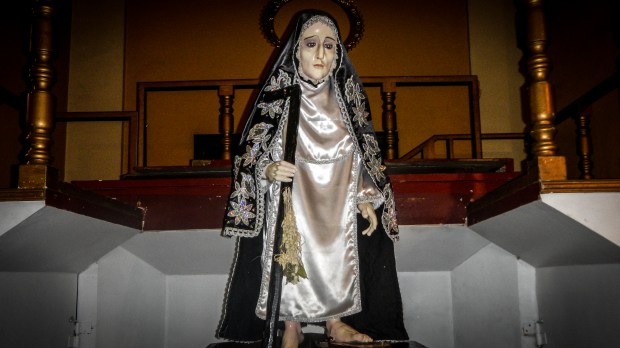Blessed Margaret of Castello (1287-1320) should never have been born. At least, that’s what her noble parents thought when they took their first look at their handicapped child.
As she grew, it only got worse. The child was, in the parlance of the day, a blind, lame, hunchbacked dwarf, and her parents were horrified. To think that a couple as wealthy and beautiful as they should produce such an undesirable child! Ashamed, they hid Margaret away.
For the first six years of her life, they kept her below stairs, concealing her among the many servants in their castle so that they didn’t have to acknowledge her as their own.
By the time Margaret was six, even this concession was too much for her self-absorbed parents. Off Margaret went to a hermit’s cell, walled into a tiny room built on to a chapel. Her parents intended that she stay there until she died. The pitying villagers, hearing of her neglect and abuse, were outraged by the parents’ behavior, but reached the same conclusion: It would be better if the child had never been born.
But Margaret disagreed. In her years with the servants, she was a delight. It was clear that she had no idea that she was different from other children. Even when her parents hurled abuse at her and walled her into a tiny prison, Margaret was grateful to be so close to the Blessed Sacrament and unmoved by their cruel words. For nine years, Margaret remained in her cell, her interior life growing and deepening as her parents’ malice continued to have no effect.
After nine years of contemplative life, visited almost exclusively by a kind priest who instructed the remarkably intelligent girl in theology and spirituality, Margaret’s life took a turn for the worse. Worried that she would be discovered and their perfect image as beautiful people shattered, her parents moved her to another cell, this one far from a church and with no access to the sacraments. This deprivation was much harder for Margaret than the scant rations and the insistence that she maintain silence lest she call attention to herself.
Finally, though, there was hope. Margaret’s parents had heard of miracles being performed at a shrine some hours away and decided to take her there. Ideally, they were hoping that Margaret would be cured, but two such people were incapable of any true faith in the healing power of God. They took Margaret on the difficult journey, heavily veiled, and brought her kneeling to the shrine. There, they left her to her prayers.
Margaret prayed, asking for healing but only if it was God’s will. Looking in several hours later, her parents saw that their daughter’s back was still crooked, her form still misshapen. And so they left her to her fate, abandoning their blind child, who had never been in a public place before, without even telling her they were leaving,
Margaret prayed until the church was locked, then slept in the doorway. The next morning, the town guards told her that her parents had left. Awful as they were, Margaret loved them and refused to blame them for disposing of her as an unwanted burden. Though she was heartbroken, she forgave them, harboring no bitterness, and proceeded to a life that far outshone anything her parents could ever boast of.
When she was first abandoned, Margaret became a beggar, adopted by the homeless community in Citta di Castello and sleeping outside as they did. Yet she was a beacon of joy to all who met her, glorying in the goodness of God when most of us would see only how he had failed to provide. Her joy and kindness so impressed the townspeople that rumor of her sanctity eventually reached an order of nuns who invited her to join. Unfortunately, they felt Margaret’s holiness as a rebuke of their lax lives and ridiculed her nearly as badly as her parents had. Eventually, they kicked her out and spread rumors about her to the scandalized townspeople.
Soon thereafter, Margaret became a third order Dominican, living in the homes of generous neighbors (who certainly felt themselves lucky to host such a one). For the rest of her life, Margaret was an active-contemplative. She served the sick and the dying, visited the imprisoned, worked many miracles in life and death, and frequently levitated when at prayer.
When Margaret died, thousands of people came to her funeral praising her goodness and love and above all her refusal to be bitter in the face of terrible affliction. This unwanted child who “ought never to have been born” had become a great saint of God, bringing consolation to weary hearts and glory to God’s name.
On April 13, the feast of Blessed Margaret of Castello, let’s pray for a greater respect for the value of all life, particularly the lives of the handicapped. Let’s pray also for the conversion of abusive parents and healing for unwanted children. Blessed Margaret of Castello, pray for us!

